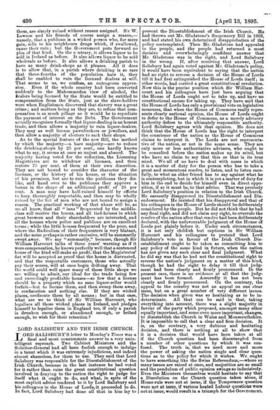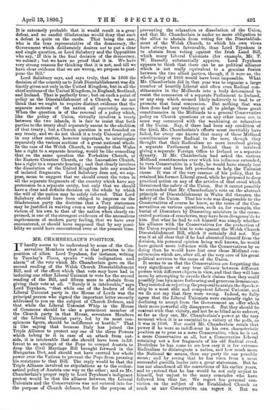LORD SALISBURY AND THE IRISH CHURCH.
IORD SALISBURY'S letter to Monday's Times was a final and most consummate answer to a very unin- telligent reproach. Two Cabinet Ministers and the Solicitor-General had all been foolish enough to indulge in a taunt which it was extremely injudicious, and indeed almost shameless, for them to use. They said that Lord Salisbury was responsible for the Disestablishment of the Irish Church, because in the last instance he had voted for it rather than raise the great constitutional question involved in denying to the nation the right to judge for itself what it ought to do, and what, in spite of the most explicit advice tendered to it by Lord Salisbury and his colleagues in the House of Lords, it proceeded to do. In fact, Lord Salisbury had done all that in him lay to prevent the Disestablishment of the Irish Church. He had thrown out Mr. Gladstone's Suspensory Bill in 1868, and had stated his own determined disapprobation of the policy contemplated. Then Mr. Gladstone had appealed to the people, and the people had returned a most decisive and overwhelmingly confident answer that Mr. Gladstone was in the right, and Lord Salisbury in the wrong. If, after receiving that answer, Lord Salisbury had again voted against Mr. Gladstone's policy, it would have been equivalent to saying that the nation had no right to reverse a decision of the House of Lords till it had first extinguished the House of Lords itself; in other words, had carried a great constitutional revolution. Now this is the precise position which Sir William Har- court and his colleagues have just been arguing that the House of Lords ought not to take up, and have no constitutional excuse for taking up. They have said that the House of Lords has only a provisional veto on legislative measures, that when the House of Commons really repre- sents clearly national opinion, the House of Lords ought to defer to the House of Commons, as a merely advisory authority defers to the ultimately responsible authority. Lord Salisbury agrees with that opinion. He does not think that the House of Lords has the right to interpret the conscience of the nation as the House of Commons claims to interpret it. The Lords are not representa- tive of the nation, or not in the same sense. They are only more or less authoritative advisers, who ought to be consulted before the nation makes up its mind, but who have no claim to say that this or that is its true mind. We all of us have to deal with cases in which it is a matter of duty for the person who has to take a great and momentous resolve, to listen, and to listen care- fully, to what an elder friend has to say against what he is contemplating, but in which it is yet a matter of duty for him in the end to decide for himself even in direct oppo- sition, if so it must be, to that advice. That was precisely Lord Salisbury's position in relation to the Irish Church. He earnestly disapproved its Disestablishment and Dis- endowment. He insisted that his disapproval and that of his colleagues in the House of Lords should be deliberately considered by the people. But he did not think that he had any final right, and did not claim any right, to overrule the resolve of the nation after that resolve had been deliberately declared, with the unfavourable judgment of the House of Lords put plainly before it. Under such circumstances, it is not only childish but captious in Sir William Harcourt and his colleagues to pretend that Lord Salisbury's vote in favour of the Irish Church Dis- establishment ought to be taken as committing him to any policy of the same kind in future, when the nation has not given any such clear and final judgment. What he did say was that he had not the constitutional right to reverse the nation's judgment on a matter of this kind, though he had the right to delay it till that judg- ment had been clearly and firmly pronounced. In the present case, there is no evidence at all that the judg- ment has been formed. Assuredly it has not been clearly and firmly pronounced. On the contrary, the appeal to the country was not an appeal on one clear issue, but on a great number of very different issues. The decision when given was so hesitating as to be in- determinate. All that can be said is that, taking everything into account, there was a slight majority in favour of the party which proposed, amongst many other equally important, and some even more important, changes, to disestablish the Church in Wales and Monmouthshire. It is impossible to call that a clear and firm decision. It is, on the contrary, a very dubious and hesitating decision, and there is nothing at all to show that it is a decision that would have been taken at all if the Church question had been disentangled from a number of other questions by which it was con- fused. The truth is, that we need more and more the power of asking the nation single and clear ques- tions as to the policy for which it wishes. We ought to have something like the Swiss Referendum,—where so many issues are raised at once, and majorities are so small and the pendulum of public opinion swings so indecisively. Even the Ministers themselves would hesitate to say that a Dissolution on the Church question taken alone, if Home-rule were not at issue, if the Temperance question were not at issue, if various heated Labour questions were not at issue, would result in a triumph for the Government. It is extremely probable that it would result in a great defeat, and no candid Gladstonian would deny that such a defeat is quite on the cards. That being the case, who is the true representative of the democracy, the Government which deliberately desires not to put a clear and single question, or Lord Salisbury and the Opposition who say, If this is the final decision of the democracy, we submit ; but we have no proof that it is. We have very strong reasons for thinking that it is not, and till we have clear evidence that we are wrong, we propose to post- pone the Bill.' Lord Salisbury says, and says truly, that in 1868 the decision of the country as to Irish Disestablishment was dis tinctly given not only in the United Kingdom, but in all the chief sections of the United Kingdom, in England, Scotland, and Ireland. That is perfectly true ; but on such a point of policy as the Disestabtishment of a Church, we do not think that we ought to require distinct evidence that the separate sections of the nation all separately concur. When the question is of the reversal of a policy which, like the policy of Union, virtually involves a treaty between the two islands, it is fair to insist that both parties to the treaty shall separately assent to the abolition of that treaty ; but a Church question is not founded on any treaty, and we do not think it a truly Unionist policy in any other matter, however important, to interrogate separately the various sections of a great national whole. In the case of the Welsh Church, to consider that Wales has a right to a separate hearing, would be like conceding that on the same question the Yorkshire Church, or the Eastern Counties Church, or the Lancashire Church, has a right to a separate hearing ; and that clearly involves the dissolution of the United Kingdom into any number of isolated fragments. Lord Salisbury does not, we sup- pose, mean to suggest that we should count the votes in all the separate fragments of the country which have any pretension to a separate entity, but only that we should have a clear and definite decision on the whole by which the will of the nation may be safely inferred. That Lord Salisbury should have been obliged to impress on the Gladstonian party the doctrine that a Tory statesman may be justified in waiving even a very deep political con- viction of his own to that of the nation when clearly ex- pressed, is one of the strongest evidences of the anomalous captiousness of modern party feeling, that we have ever encountered, or should have supposed that by any possi- bility we could have encountered even at the present time.



































 Previous page
Previous page